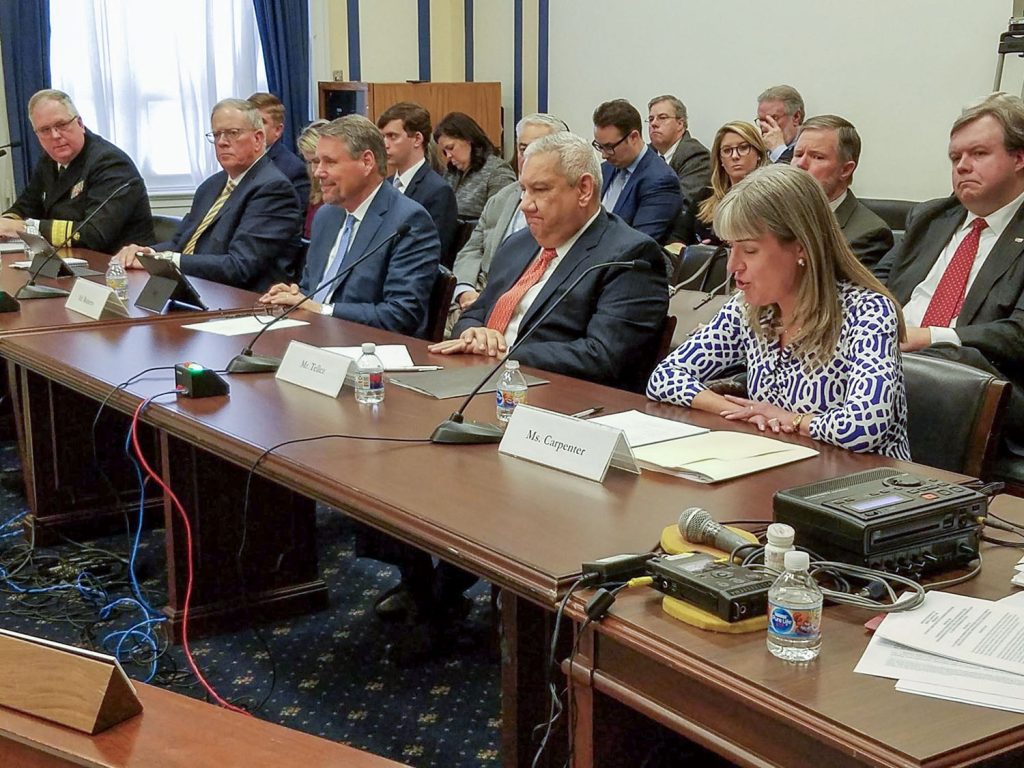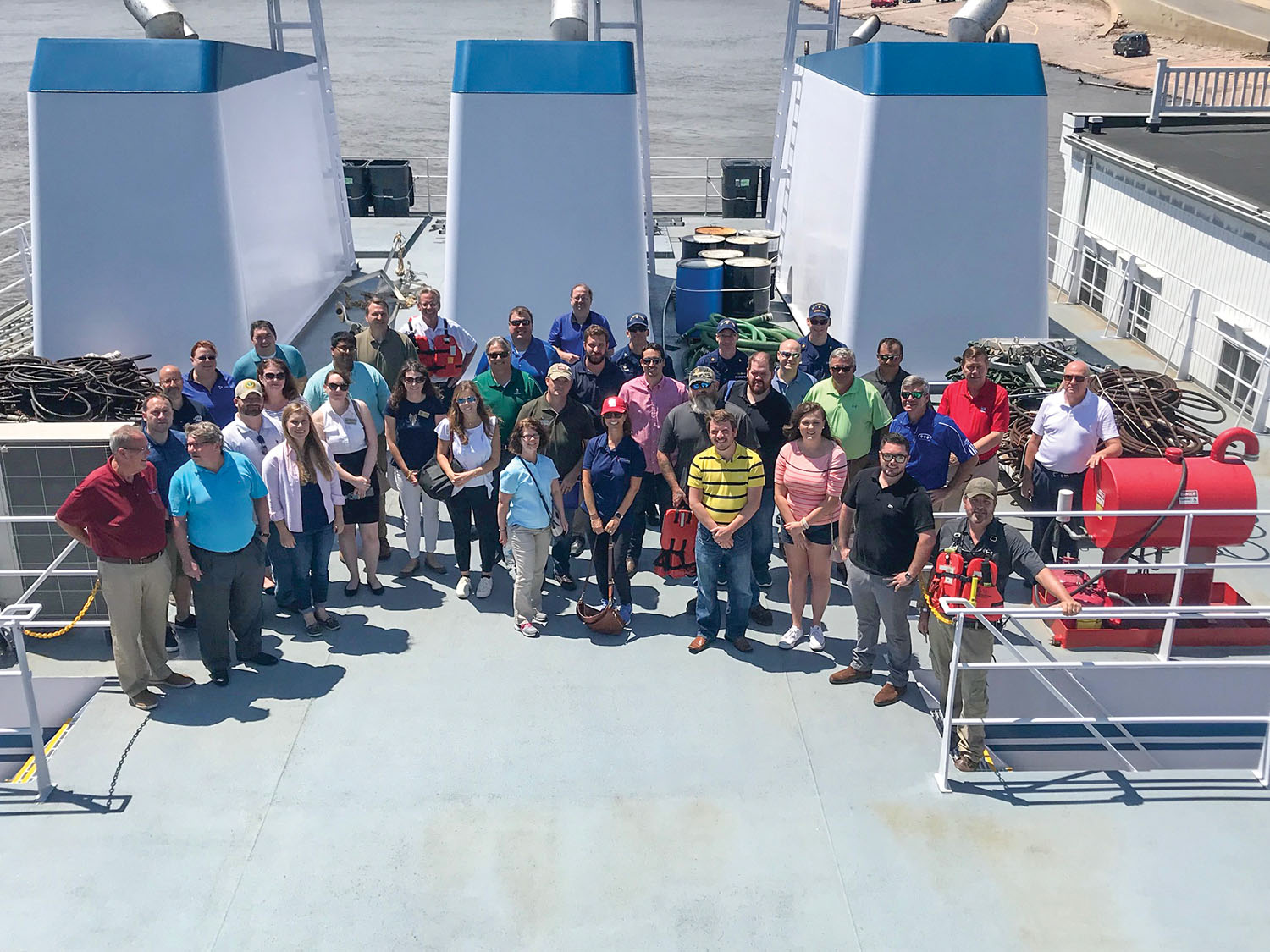Jennifer Carpenter, president and CEO of The American Waterways Operators since 2020 and a 34-year veteran of the organization, reflected on AWO’s 80 years of service to its members as its annual meeting approached.
It’s a voyage that is always changing. The week that Carpenter began working with the AWO was the same week that Congress passed the Oil Pollution Act of 1990 (OPA90) in the aftermath of the Exxon Valdez oil spill—a landmark law that changed almost everything for the maritime industry. “At that time, the industry’s safety focus was on not spilling oil,” Carpenter told The Waterways Journal. “We’ve come a long way and seen a real evolution of thinking since then.”
“As the voice of the tugboat, towboat and barge industry—inland, coastal and harbors—AWO has always occupied a unique position in advocating for the issues most important to our industry,” Carpenter said.Industry leader involvement
A big part of the AWO’s effectiveness and strength has always been the close involvement of active industry members. “We are so fortunate to have so many talented members of our industry who take time to serve on our board and help tell our story,” Carpenter said. “When we invite government officials onto our boats and into our fleets and terminals, it makes all the difference to our outreach to have AWO members themselves explain how proposed bills or regulations might affect their companies, waterways commerce or the safety of the men and women working on our waters.”
Two current board members, Rick Iuliucci and Kelly Teichman, illustrate that strength. Both have a long history of active involvement with AWO and other industry groups. Iuliucci, vice president of The Vane Brothers Company, worked his way up in the industry, having attended the Harry Lundeberg School of Seamanship at Piney Point, Md., before getting his license. He is nearing the end of his term as chairman of AWO’s board. Iuliucci’s top concern, he said, is the labor crunch that is facing the entire marine industry. “Everyone in our industry is grappling with it,” he said.
Teichman, chairman of the board at T&T Marine, was elected vice chair of AWO’s board last year and will take the helm as chair at AWO’s Spring Convention in May. This year Teichman celebrates the 80th birthday of her mom, a longtime chief financial officer at T&T, as well as the AWO’s 80th anniversary. Teichman is part of the fourth generation of family members at T&T Marine Salvage; her first active involvement in the industry came at age 2 when she helped christen her namesake boat, the Kelly T. “We were free labor,” she jokes about her family members.
Teichman and Carpenter came up together in AWO. “Jennifer was a visible crackerjack female in an industry that didn’t have a lot of them back then,” Teichman said. The first enterprise Teichman was involved in was the Responsible Carrier Program, one of AWO’s signature initiatives, which provided a bridge to what became Subchapter M and further branded safety—of crews, cargoes and the environment—as an essential part of AWO’s institutional DNA.
National And State Advocacy
Iuliucci told The Waterways Journal that the most important issues of the past five years have been the COVID-19 lockdown and its aftermath and the ongoing crisis in recruitment, which affects a broad swath of industries.
“During the lockdown, we had to reinvent how we operated and how we communicated,” he said. “And when the lockdown was over, our members had to cope with a surge in demand and supply chain disruptions.”
Besides the effects of the COVID lockdown, a recent change related to AWO’s mission of advocating for the inland maritime industry relates to where regulatory challenges to the industry are coming from. “As a national organization, the AWO has traditionally focused on issues in Washington—on dialogue and cooperation with the Coast Guard, the Corps of Engineers and other federal agencies that affect our business,” he said. Carpenter echoed that insight.
AWO is known for its work among advocacy groups in Washington. It has had to expand its presence in the states in recent years. “It’s no longer enough to focus only on Washington and federal agencies,” Carpenter said.
In the past five years, more challenges to the Jones Act and other pillars of the maritime industry have been coming from the states. A recent example has been California’s refusal to modify stringent proposals for putting untested and potentially unsafe diesel particulate filters on marine engines in harbor craft—despite the fact that such technology doesn’t yet exist, and the regulation is likely to drive harbor craft off the waters of California, causing further disruptions to marine traffic.

“Well-funded outside interests have learned to target states to get laws introduced in their states that might have less of a chance in Congress, and that might inspire laws in other states,” Iuliucci said. “They have learned how to use local issues and concerns as wedges to get the attention of state lawmakers and leverage them into proposing laws designed to achieve broader policy goals.” He said misguided state bills targeting the Jones Act often spread this way. “A lawmaker in my home state, New Jersey, recently gave a presentation on a proposed law targeting the Jones Act—and one page of his presentation didn’t even bother to remove the header material from California,” he said.
Conversations with state lawmakers must be “customized,” Iuliucci said, beginning with local issues and only then moving on to a broader list of talking points about why the Jones Act is necessary: national security, contributions to the national economy and maritime jobs in other states.
All these customized conversations require hard work and preparation—and advocates who know the state, know the issues and can communicate and work well with a wide variety of people. That has led AWO to pivot somewhat in its advocacy work. Educating members of Congress about what the inland marine industry is and what it does has always been a constant effort—but adding state legislators to that effort increases the workload of advocates.
AWO has expanded its focus on inland harbors, since what happens in California rarely stays in California. “The marine transportation system is a comprehensive entity with many parts,” Carpenter said. “The story of inland transportation closely connects to the story of coastal ports and harbors. The engagement of members from all parts of the country, operating in different regions and sectors, has greatly expanded AWO’s ability to represent the interests of all its members.”
Telling All The Stories
Transportation crises have increased the visibility of all parts of the supply chain, including waterways, to the general public. These include the logistics snarls of the COVID lockdown and demand rebound, drought and flood on the Mississippi River, obstructions on the Suez Canal, low water on the Panama Canal, and now the collapse of the Key Bridge and the closing of Baltimore Harbor.
Carpenter laughs when asked which stories are hardest to tell about AWO: the good things the organization helped make happen, the bad things it helped prevent or the bad things that happened anyway, but might have been worse without the AWO’s advocacy. “I think all those stories are equally important to tell,” she said.
For Carpenter, one story stands out above all others as needing to be told: the importance and necessity of the Jones Act, the foundation of the American maritime industry. She never misses an opportunity to speak out on this topic. Her devotion to the Jones Act was recognized when she became, in January, the first woman to lead the American Maritime Partnership, an organization representing a coalition of maritime interests who support the Jones Act.
“At no time has the case for the Jones Act been clearer or stronger for outside audiences,” Carpenter said. “Our job is to seize those opportunities to educate the public and help them connect the dots.”




